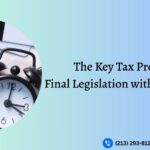
President Trump’s administration introduced a new tax legislation called the One Big Beautiful Bill Act (OBBBA). It will take effect in 2025. The House and Senate have proposed significant changes to the bill that could impact estate planning, post-retirement strategies, income tax, and more. That’s why you should stay informed about these changes, as they help you optimize your financial decisions and minimize tax liabilities.
In this blog, we will explain everything about the 2025 reconciliation bills, including a detailed comparison of House and Senate proposals, and provide insights to help you navigate these changes. In addition, understanding these personal financial planning considerations will help you make better decisions, whether you are a high-earner individual, business owner, or planning for post-retirement.
Key Tax Changes and Personal Financial Planning Considerations for 2025
The U.S. introduced new reconciliation bills “(OBBBA)”, including several modifications to the existing tax laws. In the article below, we share a detailed analysis of the most impactful changes in the Law and their implications for your financial strategy.
Income Tax Planning
Individual Income Tax Rates
- Current Law: After 2025, the Tax Cuts and Jobs Act (TCJA) rates will expire, returning to higher pre-TCJA levels.
- House Bill: It makes TCJA rates permanent, maintaining a seven-bracket structure 10%, 12%, 22%, 24%, 32%, 35%, 37%).
- Senate Bill: In contrast to the House, the Senate adds an extra inflation adjustment for lower brackets.
Planning Implications
- High-net-worth individuals benefit from permanent lower rates.
- Income acceleration strategies and Roth IRA conversions remain favourable.
- Effective bracket management is essential to minimize AGI-based phaseouts.
State and Local Tax (SALT) Deduction Cap
- Current Law: $10,000 Cap
- House Bill: Increases to $40,000 (phased out at $500,000 MAGI).
- Senate Bill: It will gradually increase to $40,400 by 2026 and revert to $10,000 in 2030.
Planning Implications
- Residents of higher-tax states will benefit.
- Consider collecting eligible deductions or adjusting trust income distributions to optimize financial decisions.
Standard Deduction & Pease Limitation
- More U.S. taxpayers prefer the standard deduction.
- Higher-net-worth individuals should strategise around the standard deduction.
Cash Flow & Retirement Planning
Mortgage Interest & Car Loan Deductions
House & Senate Bills
- Keeps the mortgage limit permanent at $750,000.
- The bills introduce a temporary deduction for car loan interest (up to $10,000).
Planning Implications
- The homebuyers benefit from stable mortgage rules.
- Consider timing vehicle purchase to maximize deductions.
Health Saving Accounts (HSAs)
- House Bill: It doubles contribution limits for lower-income earners and increases the qualified expenses.
- Senate Bill: No significant Changes
Planning Implications
- Health Savings Accounts (HSAs) remain a powerful triple-tax-advantaged tool.
- Evaluate Medicare transition strategies to consider if contributing past age 65.
Retirement Strategies for Seniors
Enhanced Deduction
- House Bill: $4,000 bonus deduction (phased out).
- Senate Bill: $6,000 bonus deduction.
Planning Implications
- The bill may influence Social Security claiming decisions.
- First-time RDM beneficiaries should defer distributions to maximize deductions.
Estate & Charitable Planning
Estate Tax Exemption
- Current Law: Return to approximately ~$5 million after 2025.
- House & Senate Bills: Increases to ~$15 million (indexed).
Planning Implications
- High-net-worth individuals should reconsider gifting strategies.
- State estate tax coordination is crucial.
Charitable Deductions
- The bill reinstates partial charitable deductions for non-itemizers ($150/$300).
- Senate Bill: The bill introduces a $1,000/$2,000 deduction post-2025.
Planning Implications
- Donor-Advised Funds or DAFs remain useful for bunching deductions.
- Qualified Charitable Distributions or QADs are still beneficial for seniors.
Business Owner Planning
Qualified Business Income (QBI) Deduction
- House Bill: The bill increases the deduction to 23% and modifies phaseouts.
- Senate Bill: It keeps the Qualified Business Income or QBI deduction at 23%, but expands eligibility.
Planning Implications
- Review compensation strategies and entity structures.
- Service-based businesses may see enhanced benefits.
Pass-Through Entity Tax (PTET) & SALT
- Senate Bill: It eliminates the State and Local Tax (SALT) cap for pass-through entities.
Planning Implications
- Business owners of high-tax states gain significant relief.
- Monitor interactions with Qualified Business Income (QBI) rules.
Action Steps for 2025 Financial Planning
- Review Tax Projections: Review how bracket changes impact your liabilities.
- Optimize Deduction: Time State and Local Tax (SALT) payments and charitable contributions.
- Revisit Estate Plan: Take advantage of high market expectations before potential policy changes.
- Maximize Retirement Saving: Use Health Savings Accounts, Roth conversions, and bonus deductions strategically.
- Consult a Professional: Consult experts such as Eric M Hunt to customize your strategy.
Frequently Asked Questions (FAQs)
1. How do the 2025 reconciliation bills affect Roth conversions?
The bills make the Tax Cuts and Jobs Act (TCJA) rates permanent, increasing predictability for Roth conversions. High earners should carefully evaluate timing to minimize taxes.
2. Will the SALT cap increase benefit all taxpayers?
No, for high earners (MAGI > $500,000), payouts could apply, reducing the effectiveness of this strategy.
3. Should I accelerate charitable giving before 2026?
Yes, if deductions are limited later, front-loading donations into DAFs may be wise.
4. How does the QBI deduction change impact small businesses?
The House’s proposed 23% deduction provides greater savings, particularly for service-based businesses.
5. What estate planning moves should I consider now?
Trust structuring and lifetime gifting can maximize the higher exemption before potential future reductions.
Final Thoughts on Personal Financial Planning Considerations
The 2025 tax legislation, known as One Big Beautiful Bill (OBBBA), introduces both opportunities and complexities. By keeping a proactive approach and aligning with these changes, you can help safeguard your wealth and improve tax efficiency. Whether you are adjusting retirement contributions, revisiting your estate plan, or leveraging new deductions, these personal financial planning considerations can help you stay ahead.
For personalized guidance, consider consulting Eric M Hunt, a trusted expert in navigating evolving tax laws.
Personal financial planning considerations are the cornerstone of a secure financial future. Start planning today!






